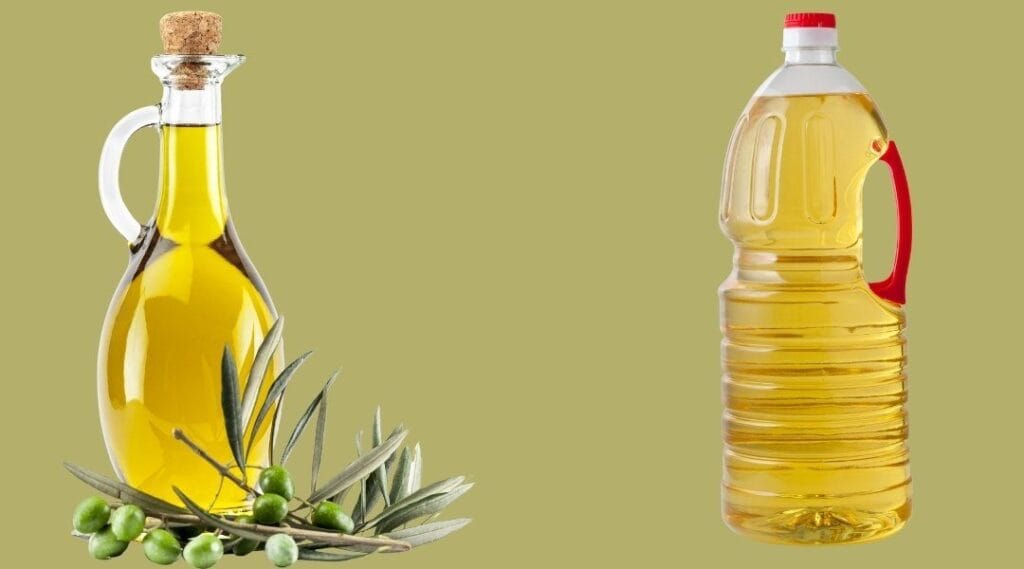As a cooking enthusiast, I have often found myself in situations where I run out of a particular type of oil while preparing a dish. This led me to wonder, can you mix vegetable oil and olive oil? The problem arises when you need a specific flavor profile or health benefits that each oil provides.
However, the solution lies in understanding the properties of each oil and how they can complement each other when mixed. In this blog post, we will delve into the compatibility of vegetable oil and olive oil, exploring the potential benefits and drawbacks of mixing them, as well as providing practical tips for doing so effectively.
Unveiling The Chemistry Of Vegetable And Olive Oils
When it comes to the chemistry of vegetable and olive oils, it is essential to understand their unique characteristics and composition. Vegetable oils and olive oils are both important sources of fats and oils in our daily diets, and they offer various health benefits.
Let’s delve deeper into the chemistry of these two oils and explore their individual properties and uses.
Also Visit:Is Vegetable Oil Gluten-Free
Vegetable Oil: The Understated Performer

Vegetable oil is a generic term used to describe oils extracted from plants, such as soybean, corn, sunflower, and palm. These oils are widely used in cooking, baking, and as ingredients in various food products. Vegetable oils are primarily composed of triglycerides, which are esters of glycerol and fatty acids. The fatty acid composition of vegetable oils varies depending on the source, which in turn affects their properties and health benefits.
Soybean oil, for example, is rich in polyunsaturated fatty acids like linoleic acid, which is an omega-6 fatty acid. This makes soybean oil a good source of essential fatty acids for the human body. On the other hand, corn oil is rich in monounsaturated fatty acids, such as oleic acid, which can help improve heart health by lowering LDL cholesterol levels.
Vegetable oils also contain a variety of bioactive compounds, such as tocopherols (vitamin E) and phytosterols, which have antioxidant and anti-inflammatory properties. These compounds contribute to the overall health benefits of consuming vegetable oils.
Olive Oil: The Mediterranean Muse

Olive oil, on the other hand, is a liquid fat obtained from the fruit of the olive tree (Olea europaea). It is a staple in the Mediterranean diet and has been prized for its health benefits for centuries. Olive oil is primarily composed of monounsaturated fatty acids, with oleic acid being the most abundant. This fatty acid has been linked to various health benefits, including reduced inflammation and improved heart health.
In addition to oleic acid, olive oil also contains a significant amount of antioxidants, such as vitamin E and polyphenols. These antioxidants contribute to the stability of olive oil, as well as its health benefits. Olive oil is divided into three main categories: extra virgin, virgin, and regular olive oil, with extra virgin being the least processed and having the highest antioxidant content.
Extra virgin olive oil, in particular, has been associated with a reduced risk of cardiovascular disease, stroke, and certain types of cancer. It is also known for its anti-inflammatory properties, which can help alleviate symptoms of various inflammatory conditions.
Can You Mix Vegetable Oil And Olive Oil?

I have always been curious about mixing different oils, especially vegetable oil and olive oil. I wanted to find out if it was possible and safe to mix these two oils together. After doing some research, I found out that mixing vegetable oil and olive oil is indeed possible and can be done for various reasons.
Firstly, mixing these two oils can enhance the flavor of your dish. Vegetable oil has a neutral taste, while olive oil has a distinct flavor. By combining the two, you can achieve a perfect balance of taste and health benefits.
Secondly, mixing vegetable oil and olive oil can also help you achieve the desired texture and consistency for your dish. Vegetable oil has a higher smoke point than olive oil, making it suitable for high-heat cooking methods like frying or sautéing. On the other hand, olive oil has a lower smoke point, which makes it ideal for dishes that require low to medium heat cooking.
However, it is essential to be mindful of the ratio when mixing these two oils. Using equal parts of both oils can help maintain the unique qualities of each oil while still achieving the desired taste and texture.
Is It Safe To Fry With Olive Oil?
Well, I’ve often wondered about frying with olive oil, and from my experience, it’s generally safe as long as you’re mindful of a couple of things. I’ve noticed that using extra virgin olive oil at a medium heat works best to avoid its smoke point. This way, it imparts a pleasant flavor to the fried food without turning bitter. Just keep an eye on the temperature, and you’ll find that frying with olive oil can be a tasty and safe choice for your kitchen adventures.
Can I Use Olive Oil Instead Of Vegetable Oil?
Well, I have found that in most recipes, olive oil can be used as a substitute for vegetable oil. However, it’s important to consider the flavor profile of olive oil, as it has a distinct taste that may not complement every dish.
In baking, especially for desserts, the flavor of olive oil might be noticeable, so I would recommend using a lighter olive oil or a different type of oil altogether. When cooking savory dishes, I often use olive oil instead of vegetable oil for its health benefits and rich flavor. Ultimately, it depends on the specific recipe and personal preference, but in many cases, olive oil can indeed be used instead of vegetable oil.
Can I Use Olive Oil Instead Of Vegetable Oil In Baking?
I think using olive oil instead of vegetable oil in baking can be a great alternative. Olive oil adds a unique flavor and richness to baked goods like brownies, bread, pancakes, cookies and it also provides some health benefits due to its high levels of monounsaturated fats.
However, it’s important to note that olive oil has a stronger flavor compared to vegetable oil, so it may not be suitable for all types of baked goods. When substituting olive oil for vegetable oil in baking, I recommend using a lighter or milder flavored olive oil to avoid overpowering the taste of the final product.
Additionally, keep in mind that olive oil has a lower smoke point than vegetable oil, so it’s not ideal for recipes that require high-temperature baking. Overall, I have found success in using olive oil in certain baking recipes, particularly those that benefit from its distinct flavor profile.
Is Olive Oil The Same As Vegetable Oil?
In my personal experience, I have found that olive oil and vegetable oil are not the same. While both are commonly used for cooking or for salad dressing, they have distinct differences in flavor, composition, and nutritional value. Olive oil is derived from pressing olives, and it is known for its rich, fruity flavor and high levels of monounsaturated fats, which are considered heart-healthy.
On the other hand, vegetable oil is a blend of various oils such as soybean, corn, canola, or sunflower oil, and it has a milder taste with a higher smoke point, making it suitable for high-heat cooking. Additionally, the nutritional profiles of these oils differ, with olive oil being praised for its antioxidants and anti-inflammatory properties.
Therefore, while both oils serve their purpose in cooking, they are not interchangeable due to their distinct characteristics.
Conclusion
In conclusion, the compatibility of mixing vegetable oil and olive oil depends on the specific types of oils and their intended uses. Both oils have their unique properties, benefits, and drawbacks.
Generally, it is safe to mix these oils in small proportions, but it is essential to consider their individual smoke points and flavor profiles when cooking. It is always best to consult a reliable source or a professional chef for specific recommendations based on the desired outcome.
FAQs
Can You Mix Olive Oil With Vegetable Oil To Fry Chicken?
Yes, you can mix olive oil with vegetable oil to fry chicken, creating a blend that adds flavor and maintains a suitable smoke point.
Can You Mix Two Oils For Deep Frying?
Mixing two oils for deep frying is common and can offer a balanced flavor profile while maintaining a high smoke point.
Can You Mix Olive Oil And Vegetable Oil Reddit?
According to discussions on Reddit, combining olive oil and vegetable oil is a personal preference, but many users find it enhances the taste when used in cooking.
Can I Mix Sunflower Oil With Olive Oil?
It’s absolutely fine to mix sunflower oil with olive oil, providing a versatile blend suitable for various culinary applications.
What Happens If You Mix Olive Oil And Vegetable Oil?
When you mix olive oil and vegetable oil, you get a balanced flavor, but it’s crucial to monitor the temperature to prevent the oils from reaching their smoke points, which can affect the taste and safety of your cooking.






